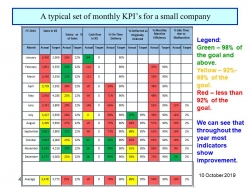My last article dealt with the question – how to approach the crisis in your business. Among other issues, I discussed employee retention vs. employment costs. On that point, I recommended you remember how difficult it is to recruit new employees, and even more so to retain them and avoid high turnover rates. So, I recommended you not be quick to fire. Firing employees is a last step, even though it seems like an easy one.
In this article I'm going to take a big step forward, and present the opportunity this crisis offers you, to engage employees with company goals.
The Anxiety and Uncertainty Regarding the Future – Are Shared by Management and Employees
Shopping malls have closed, and other than purchasing food and dry goods for emergencies, the public avoids even those stores which are still open.
Thousands of people have already been furloughed because of the paralysis striking the retail market.
One owner of a retail chain told me: "we're down from a hundred to zero in one fell swoop."
I assume you all know someone who's been furloughed, or maybe you've been furloughed yourself.
The anxiety regarding jobs and finances is yet more pressure on top of anxiety about the virus, and uncertainty about the future.
We don’t know how we'll be surprised by the virus next. Kids who went to a school party were put in quarantine because someone there was discovered to be sick. A teacher became infected and 500 students and teachers went into quarantine, and many other such examples.
One woman told me, when I asked how she was doing in the beginning of the workday: "I'm leaving now. I don’t know why I came; I'm taking work and going home. All employees are wearing masks. Did you see? I'm going!"
She was frightened. But eventually, she calmed down, stayed until the end of the day and worked like normal.
The uncertainty and personal anxiety are shared by everyone – employees, managers, owners.
There are several reasons for concern, and there is also a great opportunity.
An Opportunity for an Alliance with the Employees
While the personal anxiety is shared, the line separating employees and managers is the responsibility for the fate of the company. The role of the CEO and of management is to steer the company to success.
But the fate of the company and its success are also dependent on the employees. Are they engaged with company goals? Does its success matter to them? Management must get employees engaged with company goals, and now there's a window of opportunity to do so.
Anxious and uncertain people look for someone to lean on, and are more open than usual to lean on the company and be thankful for what they have.
Things that were seen as obvious before, are seen differently now. That's an opportunity that management needs to leverage and strengthen.
Why is This Alliance Important?
In one factory, on the production floor, I saw a graffiti: "snitches get stiches". Not a lighthearted sentence.
In this case, the "snitches" were employees who cooperated with management. I find such graffities in various factories. Employees angry at management and who feel they have no other way to express their anger or distress, or who feel their voices aren’t heard – write anti-management graffiti on factory walls or machines. In the aforementioned factory, a sign was added over time, in case somebody missed the point.
I've often written here about the important role employees play in achieving company goals. During routine operations, employees are a company's relative advantage. The costs of finances, energy, materials and technologies are similar all over the world. Employees are the factor that can make the difference. Employees who are engaged with company goals, and who see its success as their own – will make the company better than its competitors.
During this current crisis, almost anything can make the difference: do you have the financial ability to weather the storm? Do you have enough raw materials or the ability to purchase them? What about your clients, do you still have someone to sell to? And your employees? Are they available, do they come to work, is their head elsewhere? Employees are one of the important variables in this crisis.
On the Other Hand, is this Alliance the Top of Your Priorities Right Now?
In this turbulent time, with all the uncertainty about the company's future, the need to maintain sales, to collect payments, to deal with the challenge of ensuring funds and cash flow – should the CEO and management also concern themselves with engaging employees?
Is it not enough that all or most employees still have a job, and haven’t been fired of furloughed? The CEO is dealing with the company's very survival and the considerable challenge posed by an uncertain present and future. But a CEO's actions aren’t meant only to ensure the company will still be here tomorrow. I'm convinced a CEO must also look at the long term.
In the previous article, I mentioned the metaphor of an over-turned chess board, and of rearranging the playing pieces.
As part of this rearrangement, and looking at the near future and beyond, alliances made today, with suppliers, clients, and employees, will be an important support.
Some of your suppliers will take advantage of the situation and price-gouge. Some clients will not pay. But with your employees, you have a window of opportunity.
How to Engage Employees and Get Them Invested in Company Goals?
I've published several articles on engaging employees with company goals during routine times. I won't repeat them here; you're welcome to read them (for example, here, here, or here). The most important thing you can do for your employees right now is to let them know you care. That you appreciate them showing up for work despite worrying about the Coronavirus. Despite maybe having kids at home or spouses imploring them to stay home and not risk bringing the virus back with them.
The good thing is that what's important to your employees is also what's important to you. They're afraid of getting sick, and you, as their employer, also want them to stay healthy.
So the first things you can and should do are:
- Provide protective gear. Try to acquire some in whatever lawful way.
- Provide fully equipped hand washing stations and disinfectant.
- Create the necessary conditions to maintain 2 meters of space between everybody.
So far, these are ways to comply with official regulations, not anything special, yet they still require your attention, time, and money.
Now some steps you can take to let your employees know you care about them:
- Ask how they're doing, and how they're managing with the kids at home. Some of you may think it's trivial to ask after your employees' wellbeing and families, while others may think: what for? What's the point? But I hope you'll still do it.
- A brief morning talk. If you're not in the habit of having an update meeting with all employees before beginning work - now is the time to start. This will answer their need to be kept informed, a need that exists always, and is especially important in times of anxiety and uncertainty. In this talk, discuss what happened yesterday and what's expected for today. Ask for the listeners' input.
- And in general, make them feel included, appreciated, and noticed.
The You Want to Be in First Place with Your Employees?
Now is the time to quote the successful businessman Morton Mandel, from his book It's All About Who: if you want to be in first place with your employees, they have to know for sure they're in first place with you - and that starts with how you treat them. Morton Mandel showed the connection between how employees feel management's actions affect them, and how much they'll be invested in the company's success.
Two Examples
In one company, as soon as the Coronavirus threat became apparent, management worked to provide employees with safety gear (at an exuberant price) and to ensure the availability of soap and disinfectant everywhere. They also made sure to have morning updates. Those happened before the crisis too, but now included emphasis on maintaining distance from each other, on regulations, and on the need for everyone to pull together.
You could see the quick change in employees' attitudes and in how they were invested in achieving company goals.
In another company, things were exactly opposite. When I arrived there one morning there wasn't even soap to wash hands with anywhere on site. I said to the CEO, authorities are constantly calling on citizens to wash their hands, and you don't even have soap - he answered that I insulted him, because he cared about his employees very much. At the end of the day, when I pointed out the no one went to get a supply of soap all that day, and that while he came to work with a facemask, he didn't supply his employees with any - he was much more open to hearing me.
At the second company, employees are very disgruntled, and they have a long way to go.
And What About Discipline?
In times of crisis, uncertainty and human weakness - discipline and clear boundaries and regulations can be an important touchstone for employees. maintaining discipline and regulations is even more needed than usual.
Going back to the two examples above, it's no surprise that in the first company, where they invested time, attention, and resources in their employees, they also maintained discipline. In the second company, discipline was so poor even the employees themselves pointed that out to me.
And If We Had to Shut Down and Furlough Employees?
Many companies (more and more every day) have to limit or cancel work and furlough employees.
In such a case I suggest you try to see things from your employees' point of view. Think what you can promise them about the future and maintain communication with them the entire time.
Summary and Recommendations
The Coronavirus crisis affords us a golden opportunity to make an alliance with our employees. To engage them and get them invested in the company's goals and success.
Although management has to deal with important tasks and challenges, engaging the employees is also very important and shouldn't be neglected.
Whether you notice it or not, much of what you do now is about the company's existence in the future, not just tomorrow morning.
Engaging employees is an important step in that direction.
I get a lot of questions about priorities and steps to take, my recommendation is you place engaging employees as a very high priority.
When the storm calms you'll need employees again. So you should make sure to still have your best. Those who are professional, who know you and the work.
My team and I work with several companies, and see a wide picture. So, if you're interested in our professional help in dealing with the Coronavirus crisis, the best way to do so is to contact me through my website here.












 My First Book: Manage! Best Value Practices for Effective Management
My First Book: Manage! Best Value Practices for Effective Management